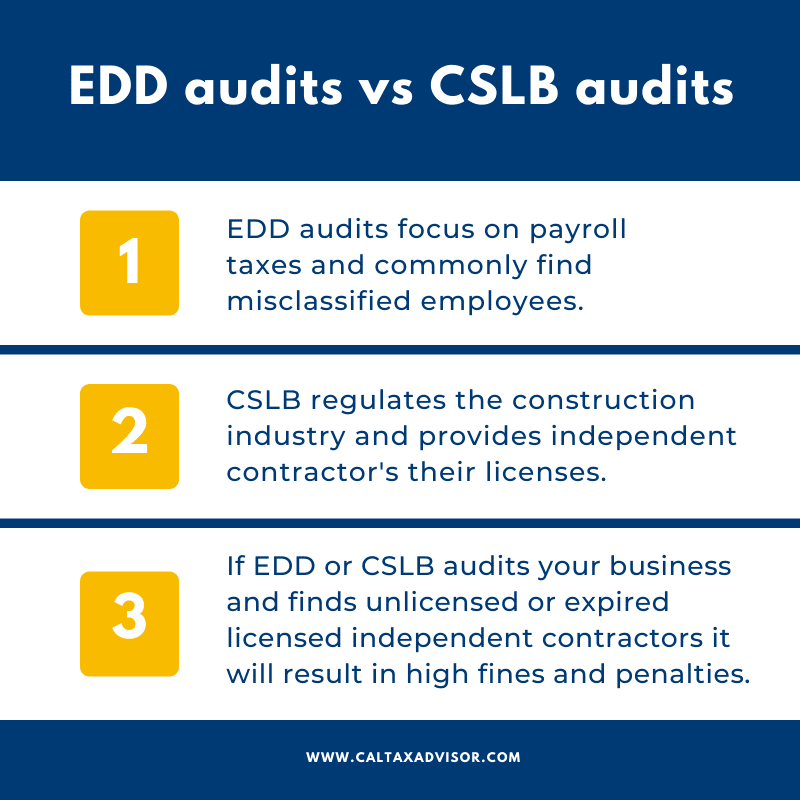The Difference Between EDD and CSLB Audits
Employment Development Department (EDD) and California Contractors State License Board (CSLB) audits both expose your business to fines and penalties if the agency finds you noncompliant with the strict regulations and policies they have in place for classifying 1099 independent contractors.
Both CSLB and EDD perform site sweeps that can initiate an audit of your construction business. CSLB is focused on (as their name suggests) licensing, whereas EDD is focused on payroll tax compliance. The effect of an audit from either CA EDD or CSLB is the same: the stoppage of work and potential penalties and back taxes.
EDD Audits
EDD audits focus on payroll taxes. When an agency, EDD, CSLB, etc. audits a business, a common audit finding is the misclassification of employees. Employers can hire W-2 employees or independent contractors (1099).
The difference between 1099 and W2 employees lies in the scope of work and which tax form each receives. Full-time and Part-time employees receive W-2 tax forms. They have a schedule set by the employer and report to their employer for daily tasks. These employees pay their employment taxes on their wages earned usually through the payroll provider who issues their checks. On the other hand, independent contractors receive 1099 forms, are not taxed on income, and have more work freedom as they are self-employed. Contractors (1099 workers) set their own hours, submit proposals and have multiple “gigs” for different companies.
The most common triggers of an EDD audit are:
- An independent contractor filing for unemployment
- Employee complaint of misclassification
- Late or inconsistent filing of taxes
- Randomized verification audit
EDD provides an in-depth checklist to guide employers on how to classify employees correctly.
Worker misclassification 1099 vs W-2
An audit by EDD can lead to criminal exposure because incorrect classification means that federal and state taxes were incorrectly filed and insurance was not provided when mandated by law. EDD identifying incorrectly classified independent contractors as W-2 employees or vice versa can open your business to fines, penalties, and potential jail time.
According to EDD, industries that run a higher risk of misclassifying workers include:
- Construction
- Hospitality
- Seasonal Industries
- Technology
- Healthcare
While you can hire unlicensed workers, they can only perform work under your license. To work under your license requires they are classified as W-2 wage-earning employees. Correctly classifying employees from the beginning of the hiring process keeps your business compliant and ready for an EDD audit if one should occur.
CSLB Audits
CSLB is a government agency that regulates the construction industry and creates policies to maintain health, safety, and general welfare for the public. They provide licenses for independent contractors that stay in compliance with regulations and rules within the state of California.
Contractors licensed in other states but working in California must apply for a CSLB license to remain compliant. Independent contractors hired and working in California must have a current and valid California license from CSLB to remain compliant with rules and regulations.
Licenses are not required by the State of California only if the independent contractor is not advertised as a licensed contractor or if the job value including labor and material does not exceed $500.
Audits performed by CSLB occur without any notification. Anyone can file a complaint or report unlicensed activity with CSLB to audit your business if they suspect suspicious activity of your worksite (including a competitor). Their statewide investigation teams conduct undercover sting operations for construction site sweeps. Agency will appear on the site itself and interview each worker to check for correct employee classification, licensing, and status.
If you are caught hiring an independent contractor without a license, with an out-of-state license, or are incorrectly classified, you will be open to the fines and penalties of an audit.
The penalties of hiring an unlicensed contractor are hefty. If you are a business and you hire a non-licensed contractor, you may be putting yourself and your business at additional risk. These risks often include lawsuits in the event of injury, fines, and potential jail time.
This year alone, CSLB conducted site sweeps across California that cited 74 people for unlicensed contracting.
To find out if your current or future independent contractors are licensed, use CSLB’s license check here. The site allows you to verify an independent contractor’s license status by entering a provided license number, or a Home Improvement Salesperson (HIS) registration number.
How Do I Make Sure My Employees are Correctly Classified?
Is your company hiring independent contractors and subcontractors? Make sure each individual has a valid license during the entire time they are working for you. Sometimes, licenses can expire or be suspended during an active job.
If EDD or CSLB audits your business and finds unlicensed independent contractors or independent contractors with an expired license, it will result in high fines and penalties.
Learn more about how got1099 can correctly verify your employees, and send you alerts notifying you if employees’ licenses have expired by clicking the link in bio.
Get the facts, order a got1099 report for your contractors to accurately assess the status of a worker you want to hire. The report includes verification of license along with notifications for license expiration so you don’t have to keep track of each individual’s license.
Check this list of industries who are exempt from AB-5 to make sure your business is in compliance here.




